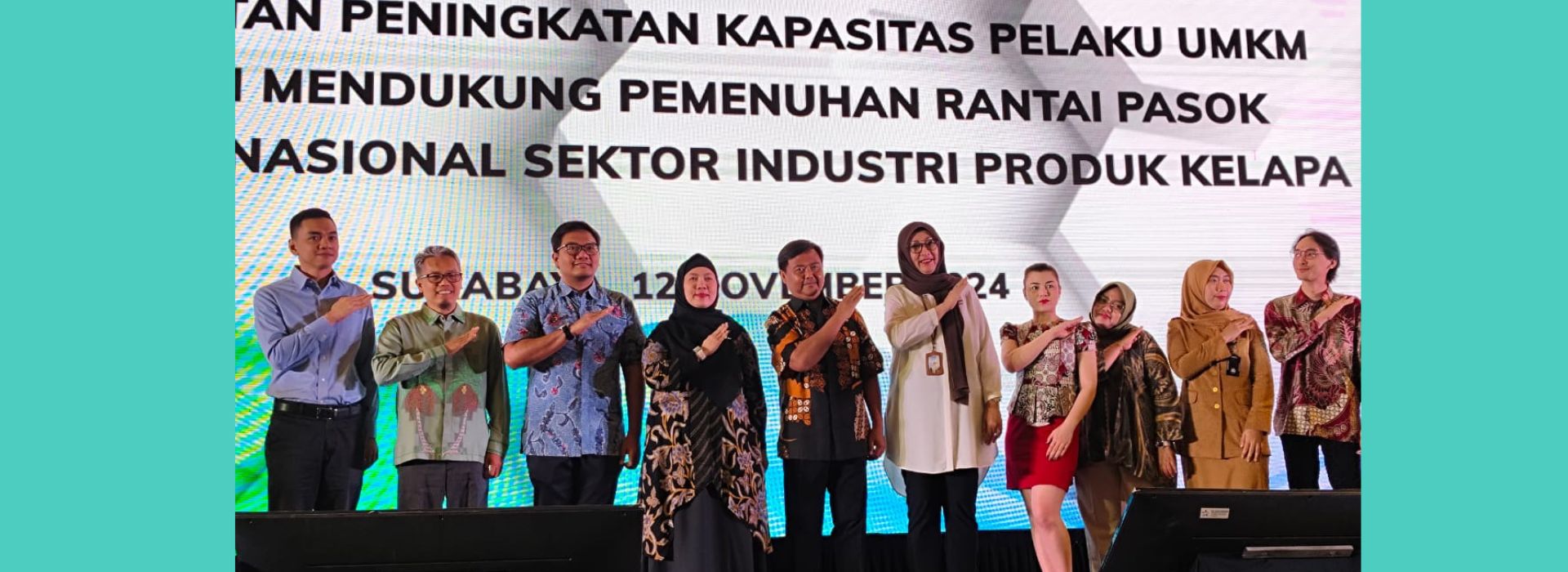In a significant push to strengthen Indonesia’s coconut industry, the Ministry of Investment/Capital Investment Coordination Agency (BKPM) held a socialization event focused on enhancing the involvement of Small and Medium Enterprises (SMEs) within the coconut product supply chain. The event took place at the Morazen Hotel in Surabaya, Indonesia, 12 November 2024, bringing together key industry players, including representatives from the International Coconut Community and local SME leaders.
The ICC, represented by Mr. Alit Pirmansah, Marketing and Statistics Officer, and Mr. Otniel Sintoro, Information and Publication Officer, joined the event to emphasize the importance of SMEs in the coconut product supply chain. With SMEs contributing significantly to Indonesia's 60% GDP and 97% workforce, the session covered a variety of capacity-building strategies tailored to help SMEs improve their integration within both national and international supply chains. Topics included methods to enhance SME capacity, increase productivity, and access global markets for coconut products.
“We believe that by empowering SMEs, we can strengthen our national industry and accelerate Indonesia’s integration into the global supply chain,” remarked Ms. Anna Nurbani, Director of Enterprise Empowerment at the Ministry of Investment, underscoring the ministry’s commitment to a more inclusive and robust supply chain.
 In his presentation, Mr. Alit Pirmansah, Marketing and Statistics Officer, ICC, provided an overview of the ICC’s mission and vision for a sustainable, inclusive, and profitable coconut sector. He highlighted the critical role that coconut SMEs play in both the upstream and downstream processes of the supply chain, from sourcing raw materials to refining and exporting high-value products. Mr. Pirmansah pointed to the global market’s significant demand for coconut products, emphasizing the potential for SMEs to capture more of this market through strategic partnerships, improved product quality, and supply chain integration.
In his presentation, Mr. Alit Pirmansah, Marketing and Statistics Officer, ICC, provided an overview of the ICC’s mission and vision for a sustainable, inclusive, and profitable coconut sector. He highlighted the critical role that coconut SMEs play in both the upstream and downstream processes of the supply chain, from sourcing raw materials to refining and exporting high-value products. Mr. Pirmansah pointed to the global market’s significant demand for coconut products, emphasizing the potential for SMEs to capture more of this market through strategic partnerships, improved product quality, and supply chain integration.
He further explained the ICC's efforts to support SMEs by promoting product diversification and developing sustainable business practices. He outlined the importance of training, technology transfer, and collaborative models that connect small businesses with larger industry players to ensure better market access and competitiveness. These initiatives aim to build a resilient coconut supply chain, allowing Indonesian SMEs to meet both local and international standards and establish a stronger presence in global markets.
Experts from the Economic and Society Research Institute, Faculty of Economy and Business, University of Indonesia (LPEM, FEB-UI), also shared insights into current trends and challenges for SMEs in the coconut industry. The five main subsectors in Indonesia’s manufacturing priority are: food and beverage, textile, electronic, automotive, and chemical, wherein the coconut sector belongs to the foods and beverage subsector. SMEs play an important role in the coconut sector downstreaming. Participants benefited from networking opportunities, where they exchanged ideas on optimizing their operations and adapting to market demands.
The event’s success signals a strong commitment from the Indonesian government and industry stakeholders to enhance coconut SME involvement in a rapidly growing sector. This initiative aligns with the Ministry of Investment’s broader goal to empower local businesses, bolstering Indonesia’s standing in the global coconut industry.

